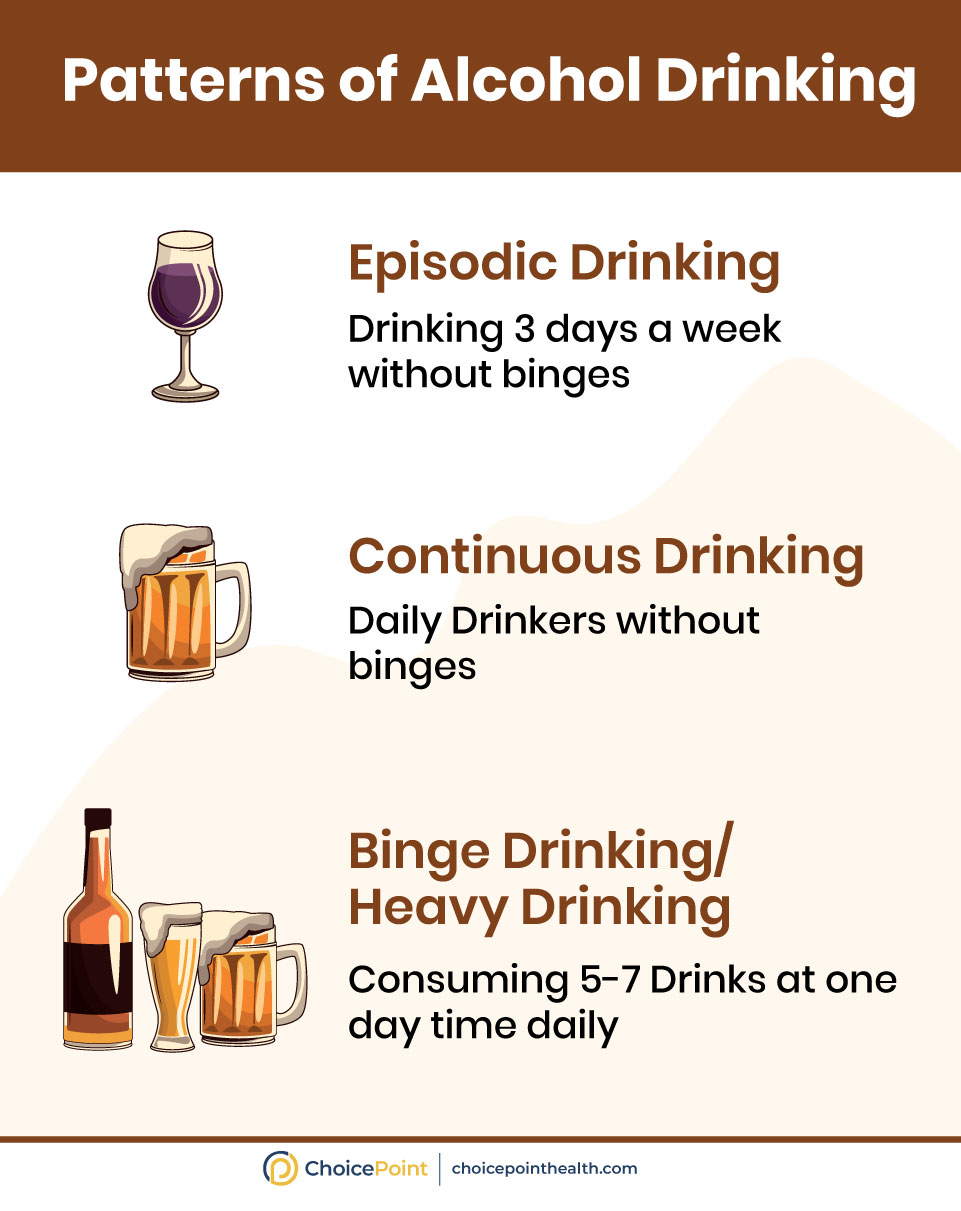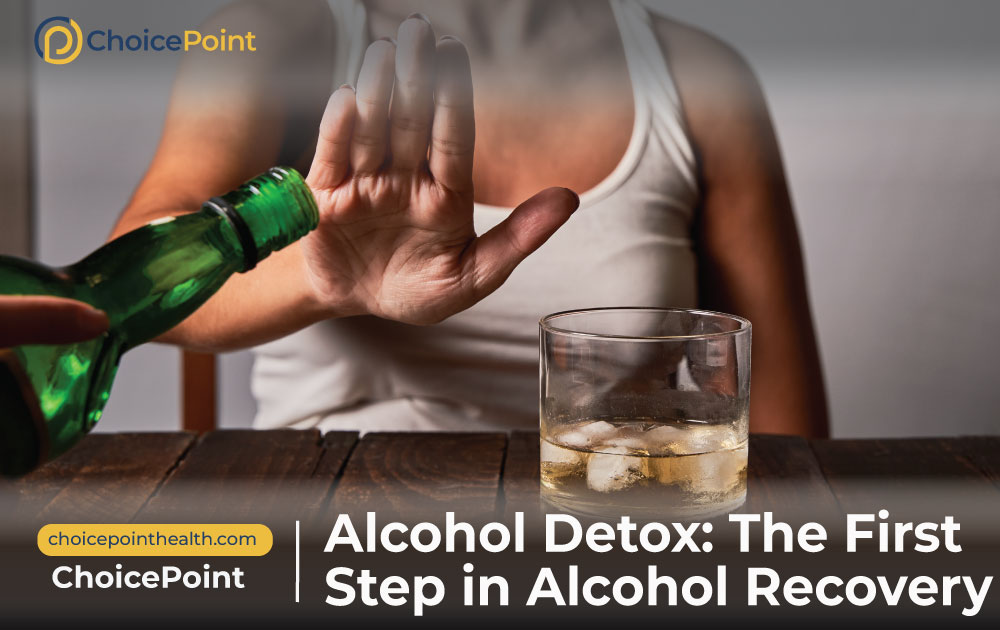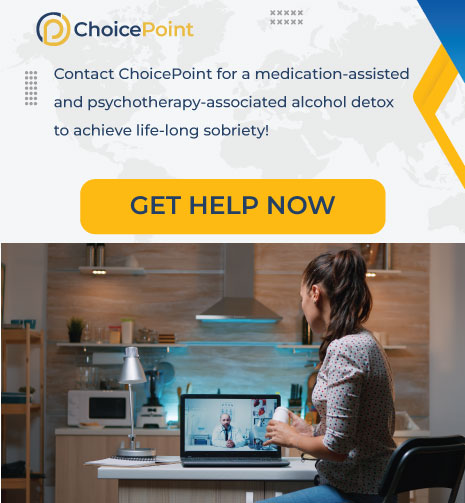The US suffers around 95,000 deaths annually from alcohol. Despite being advanced in treatment, a lack of awareness and proper treatment measures leads to fatal consequences from alcohol. One should seek medical help if one is in trouble with alcohol toxication. It is advisable to have appropriate knowledge regarding alcohol detox so that it can be opted out whenever needed. Go on to learn more!
For a worthwhile recovery from alcohol. Contact ChoicePoint for an appointment 844.445.2563.
Table of Contents
What is Alcohol Detox
Quitting alcohol can tell signs that a body is dependent on alcohol both chemically and psychologically. These withdrawal symptoms are managed clinically through a process called alcohol detox. Which involves eliminating alcohol toxication from the body and alleviating immediate withdrawal symptoms. The objectives of alcohol detox include:
- Alcohol-free body
- Relieve from immediate symptoms
- Treating co-morbidity, i.e., psychiatric and medical
Stages of Alcohol Detox
While observing the patient’s condition, alcohol detox can be governed by four stages. Alcohol detox can be varied according to the severity of addiction, time of alcohol consumed, and co-occurring disorders.
Initial Stage
Detox can start within 2 hours of the last drink that a person had, but usually, it takes anywhere between 6-24 hours for an average person to show signs of detox. They will experience mild withdrawal symptoms, which generally do not need medication at this stage, such as:
- Vomiting
- Nausea
- Insomnia
Midstage
As the initial stage diminishes, the midstage begins with more intensity and may need constant surveillance by physicians and psychologists. This is where medication and psychotherapy play the most crucial role. Withdrawal symptoms that are curbed during this stage may include:
- Fever
- High blood pressure/ breathing pattern
- Hallucination/ seizures
Final Stage
In this stage, a body becomes accustomed to alcohol absence while medications and psychotherapies continue to reduce symptoms’ severity. Also, nutritional deficiencies are curbed with supplements, salts, and a diet plan.

“I thought I’d die; when it started, it made me sick, but eventually, the medications helped.
They kept the weirdness away!”
–ChoicePoint Alumna on Alcohol Detox

“I thought I’d die; when it started, it made me sick, but eventually, the medications helped.
They kept the weirdness away!”
–ChoicePoint Alumna on Alcohol Detox
How Can Alcohol Detox Be Obtained?
Selecting the proper setup according to a person’s need, schedule flexibility, and financial status is necessary. Alcohol detox can be opted through:
However, on the research grounds, inpatient alcohol detox is better regarding safety, professional care, and effectiveness.
Start your inpatient alcohol detox today. Call Now 844.445.2563 to book an appointment!
How Do You Get Alcohol Out of Your Body?
The first step in getting alcohol out is to stop drinking for good and then join an alcohol detox where a person will be treated conforming to their health circumstances. Some of the points that need consideration going through the process involve
Medications Used for Alcohol Detox
Medications that are used explicitly in alcohol detox are usually a part of a medication-assisted treatment program and are FDA-approved, such as
- Vivitrol®
- Librium®®
- Valium®
- Naltrexone®
Many other medications are also administered but mostly require inpatient detox due to associated complications, so it is recommended to opt for inpatient alcohol detox when deciding.
Supplements to Assist in Alcohol Detox
Due to excessive consumption, a person may experience dehydration and electrolyte imbalance. To tackle this situation, physicians recommend supplements such as vitamins for alcohol detox.
- Folic acid (B12)
- Thiamine (B1)
Also, a diet rich in calcium and magnesium is provided to restore the balance of salts that were previously curtailed due to excessive alcohol use.
How Long Does It Take for Alcohol Detox?
On average, it takes anywhere between 7 to 10 days for a comprehensive alcohol detox, but depending on a person’s body and certain factors such as
- General health condition
- Gender, weight, age
- Tenure of drinking
- Severity of symptoms
- Alcohol dependency
A detox time can increase or decrease. The withdrawal symptoms are usually experienced between 1-48 hours after the last drink, so it is better to be under careful and expert observation to avoid fatal consequences.
If you need specialized alcohol detox for students, expecting mothers, veterans, and LGBT, we are here to assist you. Call to get started today 844.445.2563!

Stages of Alcohol Addiction
Treatment After Alcohol Detox
Alcohol detox is just the initial step in treating alcohol addiction. To have a life completely free of any alcohol/substance dependence, an individual must go through a complete rehab process that may include the following.
Dual Diagnosis in Alcohol Addiction
For the issue of comorbid conditions like addiction and mental disorders (anxiety, trauma), an alcohol rehab center will first screen and classify a person for their dual diagnosis program. It is a specialized treatment program that extensively treats co-occurring disorders under physicians and psychiatrists, only possible under inpatient detox settings.
Addiction Therapy for Psychological Alcohol Detox
Psychotherapies are started during the midstage of alcohol detox and continue till permanent sobriety is achieved. They may include:
- Behavioral therapy, such as Cognitive and Dialectical
- Personal therapy, such as individual and family
- Social therapy, such as peer-peer group therapy
These therapies improve thinking patterns, discourage negative behavior, and develop coping mechanisms to deal with stressful situations without using alcohol or any other substance.
Moreover, it also helps to revive social and personal relationship status to normal to live a life full of care, love, and sobriety. Medications like Vivitrol® are also administered to alleviate brain withdrawal symptoms and resist brain reward centers to normalcy.
Aftercare Plan: From Detox to Maintaining Sobriety
An aftercare plan usually comes after a person has obtained initial sober stages, which includes
- Relapse Prevention Plan
- Diet Plan
- Peer support
Following alcohol detox and remaining treatment, an aftercare plan helps to ensure effective challenge management and a distracting mind to avoid getting back to alcohol.
If you are looking for alcohol detox with 24/7 virtual support toward continuing sobriety, contact ChoicePoint 844.445.2563.
Where Can I Get Alcohol Detox?
Putting it all together, if you are looking for a versatile alcohol detox that provides all the essential services and assists your journey toward recovery. Get in touch with ChoicePoint. We have DEA-certified specialists and personalized addiction support that will suit you well for a long-lasting, sober life.
We can cover your treatment under various insurance programs; call [844.445.2563 or fill out the form to verify.
Get the Answers You Need
You might be wondering about some queries we have answered:
Can You Detox From Alcohol at Home?
No! Alcohol detox comes with withdrawal symptoms that often become unbearable with time. As the body develops dependence, it needs something to carry on. The only way to safely detox from alcohol is an alcohol rehab that provides medication and 24/7 professional observance in safely detoxifying from alcohol.
Can You Die From Detoxing From Alcohol?
Yes! It is possible to die as sudden quitting leads to delirium tremens, tremors, and cardiac complications, so it is advisable if someone is suffering from severe alcohol dependence, they should only detox under professional medical observation.
Can You Drink Alcohol While Detoxing?
No! Alcohol detoxification requires complete avoidance of alcohol before beginning, as alcohol may interact with alcohol detox medications such as Naltrexone and Subutex and can cause liver or kidney failure. So, it is advisable to eradicate alcohol from the system before beginning medicated detox thoroughly.
Is Addiction a Disease?
Yes! Addiction is a chronic disease that affects a person’s physical, psychosocial, and spiritual well-being and becomes hard to eradicate if prolonged and may lead to fatal consequences.
How Long to Rewire Brain From Addiction?
Recovering from addiction is a long process, but the brain can rewire from its dependence from as minimum as one month to up to 14 months, depending on the metabolic rate and social circumstances of a person.
Does Insurance Cover Addiction Treatment?
Yes! Most insurance cover addiction treatment. However, it all depends on the insurance type and plan you have adopted. Fill out this form to check whether your insurance covers addiction treatment!
Medical Disclaimer:
ChoicePoint aims to improve the quality of life for people struggling with substance use disorder and mental health issues. Our team of licensed medical professionals research, edit and review the content before publishing. However, this information is not intended to be a substitute for professional medical advice, diagnosis, or treatment. For medical advice please consult your physicians or ChoicePoint's qualified staff.











Review Alcohol Detox: The First Step in Alcohol Recovery.